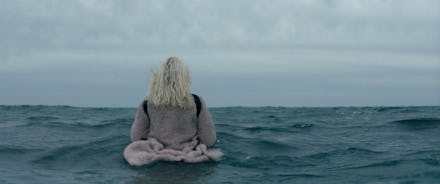'The Discovery' wants to let you know an afterlife exists, and little else

Review: Mic contributors and staff writers offer their takes on the latest movies, TV shows, books and music releases.
The Discovery, a new film that made its public debut on Netflix Friday, has an enticing and simple sci-fi premise: What if it could be scientifically proven that an afterlife exists? How would the rest of the world react to it? And on a more macro level: What does this mean for humanity?
It's to The Discovery's credit that the answer to a lot of these questions is presented in the film's cold open, which features a televised interview between a journalist and a scientist who discovered the afterlife, Dr. Thomas Harbor, played by Robert Redford. At this point, it's best to stay mum, as the rest of the sequence is gripping stuff. But the cold open's excellence ends up being The Discovery's biggest weakness, because the rest of the film has little else to say about the world it created.
The Discovery follows Will, Harbor's estranged son. Will decides to visit his father and younger brother Toby after learning that they've made some progress in their Discovery-related research. On the island ferry that's taking him to where his father and brother live, Will meets a woman, Isla, and the two take an interest in each other. Isla bids farewell, however, once they arrive on the island, saying they'll never run into each other again. To the audience, it won't come as a surprise: They do meet again.
Isla plans to join the millions of people on Earth who decide to kill themselves once the "Discovery" is made public, but Will intervenes before she's able to go through with it. From there, we learn what Dr. Harbor has been laboriously working on since his scientific breakthrough: What is the afterlife actually like once people go there?
This narrative shift is to The Discovery's detriment, as the rest of the film is a balancing act between learning more about the afterlife and the budding romance between Will and Isla. It doesn't really settle on either, and as a result, both storylines are strikingly thin.
The chemistry between Will and Isla — and actors Jason Segel and Rooney Mara, respectively — never really takes off. It feels like the script demands the two characters fall in love, but they're not sure what to do with it. Meanwhile, the fact that so little is known about the afterlife yet millions of people have killed themselves in the years since Harbor's discovery was announced isn't really explored, and it's not a good look to put mass killings in your narrative back burner.
Despite these flaws, The Discovery does stick its landing with an effective third act twist that puts the rest of the story in a new perspective. Without giving much away, it's one of those twists that rewards a second viewing, should the viewer be so inclined (and it's on Netflix, so you can always revisit individual scenes instead of the full thing).
We've seen a promising uptick in thought-provoking sci-fi recently — think the Oscar-nominated Arrival, and Colossal, which arrives in theaters April 7 — and The Discovery is certainly the thinking person's sci-fi drama. Though The Discovery doesn't come close to the pedestal of the aforementioned films, it's rather fitting that its availability is exclusive to Netflix. Indeed, in spite of some blemishes, it's still worth a late-night binge for any self-proclaimed sci-fi buff.
Mic has ongoing Netflix coverage. Follow our main Netflix hub here.